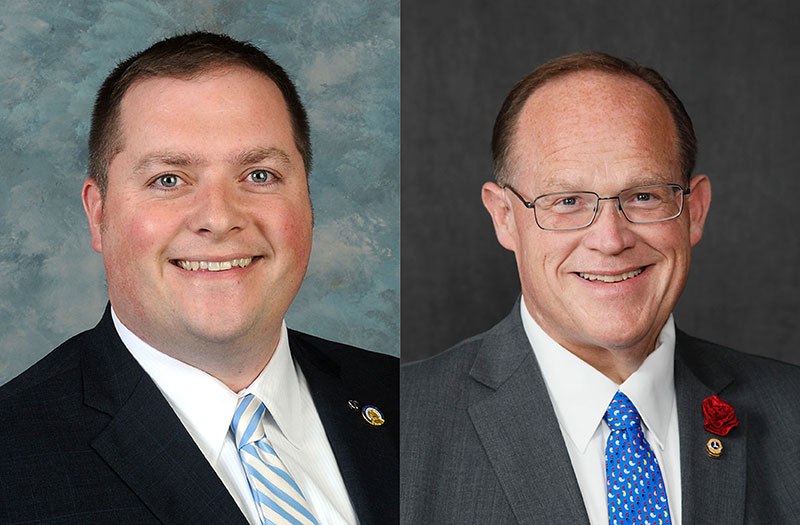The crowd at the annual Fancy Farm picnic in August hurled insults and boos for hours at candidates for statewide office this fall. All the races were partisan – with a Republican and Democratic candidate – except for one race.

The 1st District Supreme Court of Kentucky election on Nov. 5 is nonpartisan. There’ll be no “R” or “D” listed on the ballot next to the two candidates for this judicial seat – Republican State Sen. Whitney Westerfield and Court of Appeals Judge Christopher Shea Nickell.
The election is conducted on a nonpartisan basis is supposed to align with the Supreme Court of Kentucky’s desire to keep state courts – and elections for court seats – impartial and independent from outside influences.
Yet the rhetoric of one of the candidates during this fall’s campaign season is raising ethical questions about the impartiality of the election and how judges are elected in Kentucky.
Whitney Westerfield was the last to speak at the Fancy Farm picnic.
“We count on judges to uphold the law and apply the law as it’s written, but what they don’t get to do is legislate from the bench. But that’s happening. Liberal activist courts and judges across the country are weaponizing our court system to do just that,” said Westerfield at Fancy Farm. “I’ve relentlessly protected the unborn and our Second Amendment, and I’ve done all of that while upholding and respecting the rule of law.”
The last man to permanently hold the 1st District Kentucky Supreme Court seat believes Westerfield’s rhetoric is ethically questionable.
“Well, I wouldn’t have given that speech as a judge,” said retired Supreme Court of Kentucky Justice Bill Cunningham. “When you start talking about specific issues like he was talking about you’re taking positions. You’re getting very close to making a commitment on how you’re going to vote (on the bench).”
Cunningham, who considers himself politically to be a Democrat, said Westerfield’s comments might also violate the Kentucky Code of Judicial Conduct. The code is a set of rules judges and judicial candidates are required to follow to “respect and honor the judicial office as a public trust and strive to maintain and enhance confidence in the judicial system.”
Cunningham believes the Fancy Farm speech by Court of Appeals Judge Christopher Shea Nickell, the other candidate facing Westerfield, was appropriate because Nickell primarily talked about his qualifications and background for office.
“So, (Westerfield) says that – and Roe v. Wade is the law of the land. So, is he saying that he’s not going to follow it? What does that say to the people up there that disagree with you,” said Cunningham. “It could possibly be unethical, but let me say this in his defense – I’ve heard a lot worse.”
In a following phone call, Westerfield said he thinks his speech was in line.
“The role that I have today is widely different than the one I would have as a member of the court. And I mention those in the context of what I did as a policy-maker. But as a judicial member of the court, I would have to set aside my policy-making decisions aside and apply the law,” said Westerfield. “I actually spent a great deal of time reading (the code) before I got in the race and since I got in the race to remind myself what I’m allowed to do, what I’m not allowed to do, having never been a judicial candidate before.”
At a September forum in Paducah between the two candidates, Westerfield’s rhetoric aligned closely to his speech at Fancy Farm. He again double-downed on previous comments, saying his speech didn’t violate the Kentucky Code of Judicial Conduct.
At that forum, Nickell said he would “leave it to others” to comment on Westerfield’s rhetoric and said he believes he shares many of the same views with Westerfield.
“We’ve both been endorsed in the past by the Kentucky Right To Life organization, we’re both well-known life-long conservatives. It’s no secret that I support the Second Amendment. I support all the Constitution,” Nickell said. “Judges, separate from any other official elected through the electoral process, must be independent, they have to be impartial and make their decisions based solely on the constitution and the rule of law … on the other hand, I also recognize voters have the right to know who they’re voting for. So I try to be transparent with who I am.”
Toeing the free speech line
University of Kentucky College of Law Professor Joshua Douglas helped author the latest version of the Judicial Code of Conduct in 2018. He said it’s a fine line between the free speech rights of judicial candidates to express themselves and the Supreme Court of Kentucky’s desire to have an unbiased judiciary.
“You can certainly identify who you are and your general beliefs. You’re not supposed to say how you would rule on particular issues, as well as to not make overtly political or partisan statements regarding one particular political party over another. But, of course, you can identify who you are and what you believe as a general matter,” Douglas said. “Just the nature of the language of the first amendment necessarily opens the door to interpretation and difficult line-drawing problems.”
A federal appeals court in 2010 struck down parts of the old version of the Kentucky Code of Judicial Conduct because it was ruled it restricted the free speech of judicial candidates too much.
In the new code published in 2018, judicial candidates can identify as a member of a political party, but can’t identify themselves as a nominee of said party. Judicial candidates are also barred from making “pledges, promises, or commitments” on matters that may come before the court to help maintain the court’s impartiality.
This is a change from the old code of conduct that barred candidates from identifying “as a member of a political party in any form of advertising or when speaking to a gathering” and barred candidates from making statements “that a reasonable person would perceive as committing” to a vote on issues that may come before the court.
“Think of the losing litigant, someone who loses at court. You never want that person to say, ‘I lost because that judge was biased against me and had a partisan agenda’. So it’s really just about fairness,” Douglas said. “And no one will be able to shed their partisanship entirely, but it makes people uneasy when judicial candidates are being so explicit about political viewpoints.”
A judge selection debate
Yet Douglas said to better achieve an impartial and independent Kentucky court system, judges shouldn’t even be elected. Instead, judges should be appointed by an independent commission. He said this would decrease the amount of outside campaign contributions to judicial elections from partisan groups to influence an election.
Douglas Keith, counsel with the nonprofit law policy institute Brennan Center For Justice at New York University, agrees.
“You’re seeing the money come in not just from groups in the state but also national groups. And they’re spending both in states with partisan and nonpartisan elections,” said Keith. “Once voters start electing judges. It’s hard to take away an election from folks that like having the power to make the decision themselves. And so there are things that states can do, even when they elect judges to make the process better, less, less problematic.”
He said for states that still do want to have judicial elections, governments can pass campaign contribution disclosure laws to make judicial elections more transparent to potential political influences. A 2018 Brennan Center for Justice report shows the number of state supreme courts with at least one member of the court competing in an election with more than $1 million dollars in campaign contributions tripled from 1997 to 2017.
The way state judges are selected varies widely, and can depend on the level of the state court vacancy and the type of vacancy (interim, first term, additional terms) being filled.
Fifteen states including Kentucky hold non-partisan elections to elect state Supreme Court justices. Six states including Illinois hold partisan elections to elect state Supreme Court justices, and 28 states in varying ways have their governor appoint a justice.
Some west Kentucky state representatives also wish to change the current judicial electoral process. State Rep. Myron Dossett, R-Christian County, introduced a bill in January that would have changed judicial elections from being non-partisan to partisan, with judicial candidates being able to identify with a political party on the ballot.
“Those that could seek the office or were in the legal world weren’t too enthused with it.” Dossett said. “And I know one of the questions that were brought up was that this would increase the likelihood of someone in the judiciary being compromised.”
But Dossett said he believes voters should have a right to know the beliefs of elected judges, and that by having partisan elections, judicial candidates will be able to more freely speak. He also believes having partisan races will increase voter participation in judicial elections.
“It all comes back to the individual. If the individual is honest and forthright, it doesn’t matter if they’re registered a Republican or a Democrat or an independent. They’re always going to do what’s right,” Dossett said.
The next forum between the two candidates is being hosted by the Hopkinsville-Christian County League of Women Voters at the Hopkinsville Municipal Center on Wednesday.
Liam Niemeyer is a reporter for the Ohio Valley Resource covering agriculture and infrastructure in Ohio, Kentucky and West Virginia and also serves Assistant News Director at WKMS. He has reported for public radio stations across the country from Appalachia to Alaska, most recently as a reporter for WOUB Public Media in Athens, Ohio. He is a recent alumnus of Ohio University and enjoys playing tenor saxophone in various jazz groups.






